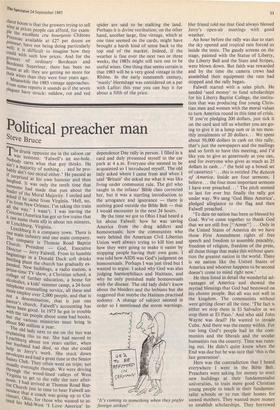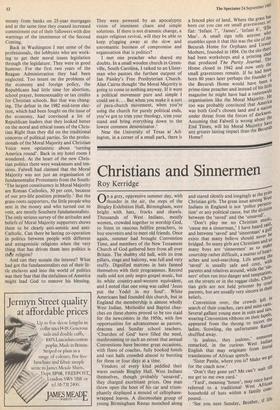Political preacher man
Steve Bruce
The drunk opposite me in the saloon car Nobody was insistent: 'Falwell's an ass-hole. cares what that guy thinks. He ain't a majority of nothing... and he pro- b. ably ain't too moral either.' He paused as if surprised at his own humour and then laughed. It was only the tenth time that someone had made that pun about the leader of the Moral Majority. I smiled and asked if he came from Virginia. 'Hell, no, I irn. from New Orleans. I'm taking this train 411 the eseen Way I wasn't. I was leaving the ....r
(America has got so few trains nut s, a can name them all) in about ten mute s, at Lynchburg, Virginia.
LYnchburg is a company town. There is onThe main industry and one main company. e co Pa President — G od, Executive Director — Jerry Falwell. From its humble beginnings nings in a Donald Duck soft drinks bottling plant the church has gradually ex- panded. New buildings, a radio station, a prime-time TV show, a Christian school, a College of further education, a home for alcoholics, a kids' summer camp, a 24-hour telephone counselling service, all these and i More employ over 2,000 people, and that is not a denomination that is just one Pastor's church. Falwell's accounting has niter been good. In 1973 he got in trouble
the tax people about some bad books, but the various ministries must bring in about $60 million a year.
The old lady next to me on the bus was explaining this to me. She had moved to hynchbu rg about ten years earlier, when her husband had died, so that she could help in Jerry's work. She stuck down envelopes and had a great time in the Senior
Club. They often went on trips; not usually overnight though. We were driving through the wood-lined valleys of West v trginia to get to the rally the next after- Uoon. I had arrived at Thomas Road Bap- tist Church just in time to hear Falwell an- nounce that a coach was going up to Cin- cinnati, Ohio, for those who wanted to at-
tend his Mid-West Love America' In-
dependence Day rally in person. I filled in a card and duly presented myself in the car park at 4 a.m. Everyone else seemed to be acquainted so I introduced myself. The old lady asked where I came from and when I said 'Britain' she asked me what it was like living under communist rule. The girl who taught in the infants' Bible class corrected her, but it was a startling introduction to the arrogance and ignorance — there is nothing good outside the Bible Belt — that I would encounter in the next 24 hours.
By the time we got to Ohio I had heard a lot about Falwell: how he was saving America from the drug addicts and homosexuals; how the communists who were behind the American Civil Liberties Union welt always trying to kill him and how they were going to make it easier by stopping people having their own guns. I was told how AIDS was God's judgment on homosexuals. Perhaps I was just tired but 1 wanted to argue. I asked why God was also judging haemophiliacs and Haitians, and why he only punished male homosexuals with the disease. The old lady didn't know about the bleeders and the lesbians but she suggested that maybe the Haitians practised sodomy. A change of subject seemed in order so I mentioned the storm warnings.
'It's coming to something when they prefer foreign strikes!' Her friend told me that God always blessed Jerry's open-air meetings with good weather.
An hour before the rally was due to start the sky opened and tropical rain forced us inside the tents. The gaudy screens on the stage, painted with the Statue of Liberty, the Liberty Bell and the Stars and Stripes, were blown down. But faith was rewarded and by the time the camera crews had assembled their equipment the rain had stopped and the rally began.
Falwell started with a sales pitch. He needed 'seed money' to fund scholarships for his Liberty Baptist College, the institu- tion that was producing fine young Chris- tian men and women with the moral values to turn America round in this time of crisis. 'If you're pledging 200 dollars, just tick it on the card and tell us whether you are go- ing to give it in a lump sum or in ten mon- thly instalments of 20 dollars... We spent about 50,000 dollars in cash on this rally, that's just the newspapers and the mailings and so forth to have this meeting, and I'd like you to give as generously as you can, and for everyone who gives as much as 25 dollars in cash...' (he held up a boxed set of cassettes) ' ... this is entitled The Rebirth of America, Inside are four sermons. I believe... the four most important sermons 1 have ever preached...' The pitch seemed to last for ever but finally the rally got under way. We sang 'God Bless America', pledged allegiance to the flag and then Falwell preached.
`To date no nation has been so blessed by God. We've come together to thank God that we are still free ["Amen"] ...Only in the United States of America do we have those First Amendment rights of free speech and freedom to assemble peacably, freedom of religion, freedom of the press, all those things that make this without ques- tion the greatest nation in the world. There is no nation like the United States of America and whoever happens to be second doesn't come to mind right now.'
He then listed in detail the wonderful ad- vantages of America and showed the myriad blessings that God had bestowed on his chosen people. But all was not well in the kingdom. The communists without were getting closer all the time. 'The fact is either we stop them in El Salvador or we stop them at El Paso.' And who said John Wayne was dead? He wanted to invade Cuba. And there was the enemy within. For too long God's people had let the com- munists and the liberals and the secular humanists run the country. Time was runn- ing out. He didn't quite know when the End was due but he was sure that 'this is the last generation'.
Here was the contradiction that I heard everywhere I went in the Bible Belt. Preachers were asking for money to erect new buildings at their fundamentalist universities, to train more good Christian young people to teach in their fundamen- talist schools or to run their homes for unwed mothers. They wanted more money to establish scholarships. They borrowed money from banks on 25-year mortgages and at the same time they coaxed increased commitment out of their followers with dire warnings of the imminence of the Second Coming.
Back in Washington I met some of the professionals, the lobbyists who are work- ing to get their moral issues legislation through the legislature. They were in good humour. For the first two years of the Reagan Administration they had been neglected. Too intent on the problems of the economy and foreign policy, the Republicans had little time for abortion, school prayer, homosexuality or tax credits for Christian schools. But that was chang- ing. The defeat in the 1982 mid-term elec- tion, which had been fought on the issue of the economy, had convinced a lot of Republican leaders that they looked better on the moral and ethical issues of the Chris- tian Right than they did on the traditional concerns of political parties. So the profes- sionals of the Moral Majority and Christian Voice were optimistic about 'turning America round'. Back in my hotel room 1 wondered. At the heart of the new Chris- tian politics there were weaknesses and ten- sions. Falwell had claimed that the Moral Majority was not just an organisation of fundamentalist Protestants from the South: 'The largest constituency in Moral Majority are Roman Catholics, 30 per cent, because of our pro-life position primarily.' But the grass-roots supporters, the little people who sent in the money and who turned out to vote, are mostly Southern fundamentalists. The only serious survey of the attitudes and beliefs of Moral Majority supporters shows them to be clearly anti-semitic and anti- Catholic. Can there be lasting co-operation in politics between people with different and antagonistic religions when the very thing that has driven them into politics is their religion?
And can they sustain the interest? What had got the fundamentalists out of their lit- tle enclaves and into the world of politics was their fear that the sinfulness of America might lead God to remove his blessing. They were powered by an apocalyptic vision of imminent chaos and simple solutions. If there is not dramatic change, a major religious revival, will they be able to keep plugging away at the slow and unromantic business of compromise and organisation that is politics?
I met one preacher who shared my doubts. In a small wooden church in Green- ville, South Carolina, I talked to an Ulster- man who pastors the furthest outpost of Ian Paisley's Free Presbyterian Church. Alan Cairns thought 'the Moral Majority is going to come to nothing anyway. If it were a political movement pure and simple I could see it... But when you make it a sort of para-church movement, when you're using the church for purely political ends, you've got to trim your theology, trim your stand and bring everything down to the lowest common denominator.'
Near the University of Texas at Arl- ington, in a corner of a small park, there is
a fenced plot of land. Where the grass has been cut you can see small gravestones set flat: 'Infant 7', 'James', 'Infant 6', '6,118 Mae'. A small sign tells anyone who stumbles upon it that this was the site of the, Becurah Home for Orphans and Unwed Mothers, founded in 1894. On the site there had been workshops and a printing shthat produced The Purity Journal. The Home closed in 1942 and now only e small gravestones remain. If he had beeth n
ed
born 80 years later perhaps the founder of the Becurah Home would have been P. prime-time preacher and instead of his 111:i;` magazine he might have had a nationwide organisation like the Moral Majority. 14 e too was probably convinced that America was both God's chosen land and a nation under threat from the forces of darkness. Assuming that Falwell is wrong about the End Times, will his Moral Majority hal, any greater lasting impact than the Beeara' Home?







































 Previous page
Previous page